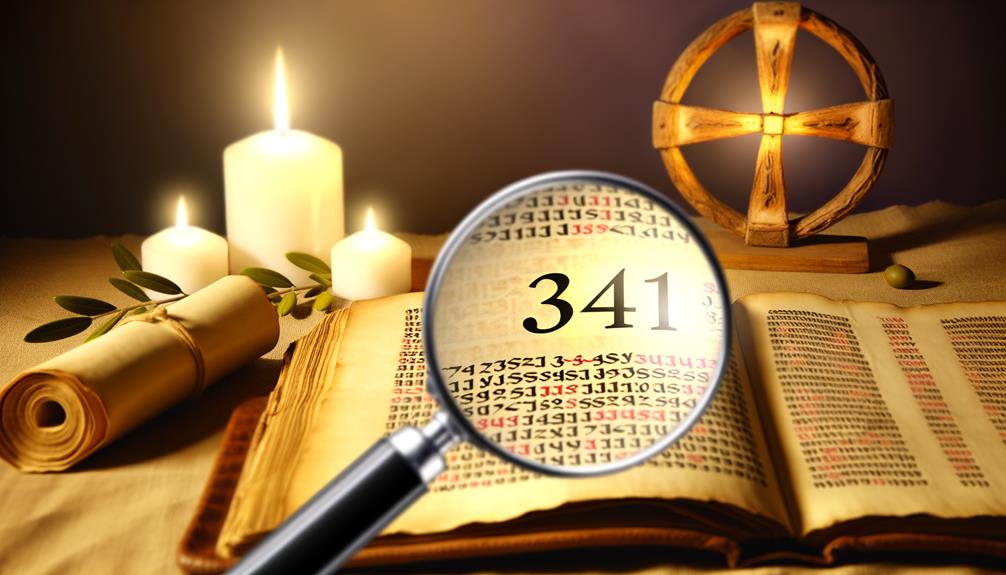341 Meaning in the Bible: Guidance and Trust
The number 341 in the Bible holds deep theological and historical significance, often symbolizing divine judgment and God’s covenant with His people. The number is an amalgamation of 3 (signifying the Holy Trinity), 4 (representing creation), and 1 (denoting unity), collectively embodying divine order and purpose.
Instances such as genealogical records and military counts emphasize its context within pivotal biblical narratives, illustrating periods of trials and divine intervention. Additionally, 341’s association with prophecy underscores its role in conveying divine forewarnings and promises, guiding a deeper understanding of God’s unfolding plan of salvation and righteousness.
Exploring further reveals detailed insights and broader implications.

341 Meaning in the Bible: Symbolism of Divine Guidance, Faith, and Spiritual Growth
| Aspect | Biblical Meaning |
|---|---|
| Divine Guidance | The number 3 symbolizes divine completeness and the presence of the Trinity (Father, Son, and Holy Spirit). |
| Foundation of Faith | The number 4 often represents foundation and creation, reflecting the stability of God’s word and the Earth’s elements. |
| Unity & God’s Will | The number 1 symbolizes unity, the power of God, and His sovereignty in creation and salvation. |
| Spiritual Growth | The combination of these numbers encourages spiritual growth, faithfulness, and alignment with God’s purpose. |
| Call to Action | 341 may be seen as a call to strengthen one’s foundation in faith and trust in divine guidance. |
Biblical Numerology Overview

Examining biblical numerology necessitates understanding the symbolic significance that numbers hold within scriptural texts, reflecting deeper theological and historical meanings. Numbers in the Bible often transcend their literal sense, embodying spiritual truths and divine principles.
For instance, the number seven frequently represents completeness or perfection, as seen in the creation week. Twelve echoes divine authority and governance, evident in the twelve tribes of Israel and the twelve apostles. Such numerological patterns offer insight into God’s nature and His relationship with humanity.
Historical context also shapes these numbers, intertwining with Israelite culture and ancient Near Eastern traditions. A scholarly approach to biblical numerology consequently requires a meticulous analysis of scripture, enriched by historical awareness and theological depth.
Occurrences of 341 in Scripture

Examining the occurrences of the number 341 in Scripture necessitates a thorough analysis of its biblical references and an exploration of its symbolic significance.
By identifying where this number appears and understanding its context, we can uncover deeper theological meanings and historical implications.
This section will provide a detailed scriptural analysis to discern the overarching themes and messages associated with 341.
Biblical References Analysis
The number 341 appears in the Bible with specific references that warrant a closer theological and scriptural analysis to understand its significance within the historical context. Instances of this number are found scattered across various books of the Old and New Scriptures.
Each occurrence invites exegetical scrutiny to uncover any underlying messages or themes. For example, in the enumeration of genealogies or the recording of historical events, such numbers often carry weight beyond their face value.
Symbolic Significance Explored
In exploring the symbolic significance of the number 341 in Scripture, one must consider its appearances within biblical narratives and their potential theological implications. The number 341, while less commonly discussed, carries layers of meaning derived from its scriptural context. Examining these occurrences can provide insight into divine messages and historical relevance.
- Connection to Prophecy: Instances where 341 appears often align with prophetic messages, indicating divine forewarnings or promises.
- Genealogical Records: It is sometimes found within genealogical listings, underscoring the importance of lineage and divine selection.
- Numerical Patterns: Scholars note its patterning, linking it to broader numerological themes in Scripture.
- Historical Events: Appearances coincide with pivotal biblical events, marking significant theological shifts.
This exploration reveals the multifaceted nature of biblical numerology.
Symbolic Significance of 341

Symbolism within biblical numerology often reveals deeper theological insights, and the number 341 is no exception, embodying concepts of divine completeness and spiritual renewal. In scripture, numbers often carry profound meanings that transcend their numerical value.
The number 3 is frequently associated with the Holy Trinity, 4 symbolizes creation or the world, and 1 represents unity or God’s sovereignty. Together, these numbers form a composite symbol that encapsulates a holistic view of divine purpose and order.
| Number | Symbolic Meaning |
|---|---|
| 3 | Holy Trinity |
| 4 | Creation/World |
| 1 | Unity/God’s Sovereignty |
| 34 | Spiritual Renewal |
| 41 | Divine Completeness |
The convergence of these elements in 341 consequently underscores themes of God’s overarching plan for renewal and completeness in creation.
Contextual Analysis of 341

Within the biblical narrative, the number 341 emerges in various contexts that highlight its theological significance and reinforce its symbolic meanings. Examining these contexts provides deeper insights into biblical themes and divine principles. For example, the number 341 is found in the context of the Israelites’ journey through the wilderness, signifying God’s provision and faithfulness. Additionally, the number appears in the symbolic measurement of the New Jerusalem in the book of Revelation, representing the completeness and perfection of God’s divine plan. When considering the meaning of 144 000 bible verse, it is essential to recognize the significance of numbers within the biblical narrative and how they contribute to the overall message and theology.
- Symbol of Divine Judgment: The number often signifies instances of God’s judgment, illustrating His righteousness.
- Covenantal Relationship: It underscores the covenant between God and His people, emphasizing faithfulness and divine promises.
- Historical Events: The number is linked to pivotal moments in biblical history, shaping the narrative of salvation.
- Prophetic Visions: It appears in prophetic literature, symbolizing future events and divine revelations.
- Numerical Patterns: The recurrence of 341 in scriptural texts suggests a deliberate pattern that invites theological reflection.
Understanding these contexts fosters a richer comprehension of biblical theology.
341 in Old Testament

In the Old Scripture, the number 341 does not appear explicitly, yet its numerical components—3, 4, and 1—hold significant theological and symbolic meaning.
- The number 3 is often associated with completeness and divine perfection.
- The number 4 relates to creation and the world.
- The number 1 signifies unity and the singularity of God.
Analyzing these numbers within their scriptural and historical contexts can provide a deeper understanding of their collective significance in biblical narratives.
Numerical Symbolism Explored
The Old Scripture often employs the number 341 to convey profound spiritual truths and intricate theological concepts. This numerical symbolism is deeply embedded in the fabric of the Old Covenant, reflecting divine wisdom and eternal principles.
- Covenant Completeness: Symbolizes the fulfillment of God’s promises.
- Divine Judgment: Represents periods of trials and divine judgment.
- Spiritual Awakening: Indicates a call to spiritual vigilance and renewal.
- Historical Continuity: Reflects the unfolding of God’s plan through history.
These layers of meaning reveal the multifaceted nature of biblical numerology, inviting readers to explore deeper into the divine narrative woven through sacred texts.
Understanding these symbols enhances one’s grasp of theological and historical contexts within the Old Covenant.
Contextual Biblical References
Examining the Old Scripture, the number 341 surfaces in various contexts that underscore its theological significance and historical resonance. The Hebrew texts often utilize numbers symbolically, and 341 can be seen as an intersection of divine interaction and human experience.
Scriptural references in the Old Scriptures, such as genealogical records and military counts, often embed deeper meanings within numerical patterns. Understanding these references requires a nuanced approach to scriptural interpretation, embracing both historical context and theological insight.
| Reference | Context | Significance |
|---|---|---|
| Genesis 5:8 | Genealogical Record | Lifespan of Seth |
| Numbers 1:46 | Census of Tribes | Total Men of Israel |
| 1 Samuel 13:2 | Military Organization | Saul’s Selected Warriors |
This table elucidates the multifaceted applications of 341, enhancing comprehension of its biblical importance.
341 in New Testament

Although the number 341 does not explicitly appear in the New Scriptures texts, its symbolic interpretation can be explored through the lens of biblical numerology and theological significance. In the New Covenant, numbers often carry profound meanings, revealing divine truths and spiritual principles. Understanding these can deepen our grasp of the text.
- Trinity and Unity: The number 3 represents the Holy Trinity, signifying divine completeness.
- Testing and Trials: The number 40 often symbolizes periods of testing or spiritual trial, as seen in Jesus’ 40 days in the wilderness.
- Unity and Primacy: The number 1 denotes unity and primacy, reflecting God’s singular nature.
- Messianic Fulfillment: New Covenant numerology frequently underscores the fulfillment of Old Covenant prophecies.
- Eschatological Significance: Numbers in Revelation, such as 7 and 12, symbolize spiritual perfection and divine authority.
Theological Interpretations

Biblical numerology provides profound theological interpretations that can illuminate the deeper spiritual truths embedded within Scripture.
Numbers such as three, seven, and twelve carry significant theological weight, reflecting divine completeness, perfection, and governance respectively.
For instance, the number seven recurs to symbolize spiritual perfection, from the seven days of Creation in Genesis to the seven churches in Revelation.
Similarly, twelve represents divine governance, evident in the twelve tribes of Israel and the twelve apostles.
The historical context of these numbers roots them in ancient Near Eastern culture, where numerology was a common interpretative tool.
Analyzing these numbers within the Bible’s historical and cultural milieu reveals a structured, divinely-ordained cosmos, offering insights into God’s nature and His redemptive plan.
Practical Applications for Believers

Understanding the theological significance of numbers in the Bible equips believers with practical insights that can deepen their spiritual walk and enhance their daily faith practices. Biblical numerology provides a framework for interpreting divine patterns, which can foster a more profound connection with God’s Word.
- Spiritual Reflection: Numbers such as 7 (completion) and 40 (testing) invite believers to reflect on personal spiritual milestones.
- Prayer Focus: Utilize numbers in structured prayer, mirroring biblical models like Daniel’s three daily prayers.
- Community Building: Recognize the significance of 12 (tribes, apostles) in fostering unity within faith communities.
- Scriptural Meditation: Engage in meditations based on significant biblical numbers to enrich understanding.
- Historical Context: Appreciate the historical and cultural contexts of biblical events by studying the numerical patterns within scripture.
These applications bridge theological knowledge with daily devotions, enriching one’s faith journey.
Conclusion
In the labyrinth of biblical numerology, the number 341 emerges as a vessel of profound symbolism, weaving together threads of divine wisdom and historical resonance.
This number, though infrequent, encapsulates layered meanings that invite deeper theological reflection.
Its occurrences, both in the Old and New Scriptures, serve as a witness to divine orchestration and spiritual truths.
The theological interpretations and practical applications of 341 offer believers a nuanced compass for steering their faith journey.






